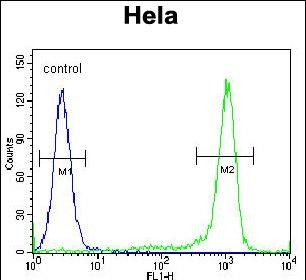

| WB | 1/1000 | Human,Mouse,Rat |
| IF | 咨询技术 | Human,Mouse,Rat |
| IHC | 咨询技术 | Human,Mouse,Rat |
| ICC | 技术咨询 | Human,Mouse,Rat |
| FCM | 1/10-1/50 | Human,Mouse,Rat |
| Elisa | 咨询技术 | Human,Mouse,Rat |
| Aliases | Krueppel-like factor 17, Zinc finger protein 393, KLF17, ZNF393 |
| Entrez GeneID | 128209 |
| WB Predicted band size | 42.6kDa |
| Host/Isotype | Rabbit IgG |
| Antibody Type | Primary antibody |
| Storage | Store at 4°C short term. Aliquot and store at -20°C long term. Avoid freeze/thaw cycles. |
| Species Reactivity | Human |
| Immunogen | This KLF17 antibody is generated from rabbits immunized with a KLH conjugated synthetic peptide between 243-271 amino acids of human KLF17. |
| Formulation | Purified antibody in PBS with 0.05% sodium azide. |
+ +
以下是关于KLF17(C-term)抗体的3篇参考文献及其简要摘要:
1. **文献名称**:*KLF17 suppresses human breast cancer metastasis by inhibiting epithelial-mesenchymal transition*
**作者**:Gumireddy K, et al.
**摘要**:该研究通过C端特异性抗体验证了KLF17在乳腺癌中抑制上皮间质转化(EMT)的功能,证实其通过调控miRNA网络抑制肿瘤转移。
2. **文献名称**:*Identification of KLF17 as a novel epigenetic regulator of the pluripotency-associated microRNA cluster*
**作者**:Chen Y, et al.
**摘要**:研究利用KLF17 C端抗体进行染色质免疫沉淀(ChIP),揭示了KLF17通过表观遗传机制调控多能性相关miRNA的表达,影响干细胞自我更新。
3. **文献名称**:*KLF17 promotes the transition from naive to primed pluripotency by regulating metabolic and signaling pathways*
**作者**:Li S, et al.
**摘要**:通过Western blot和免疫荧光(使用KLF17 C端抗体),发现KLF17通过代谢重编程和Wnt信号通路调控胚胎干细胞从初始态向始发态转变。
以上文献均明确使用KLF17 C端抗体进行蛋白功能验证,涵盖癌症、干细胞及表观遗传调控领域。
The KLF17 (C-term) antibody is a tool designed to detect the C-terminal region of Krüppel-like factor 17 (KLF17), a member of the Krüppel-like transcription factor family. KLF17 belongs to a group of zinc finger DNA-binding proteins involved in regulating gene expression, cellular differentiation, and tissue development. The C-terminal region of KLF17 contains critical functional domains, including transcriptional regulatory elements, making it a target for studying protein interactions and activity.
KLF17 has been implicated in various biological processes, including cancer progression and metastasis. Research highlights its role as a tumor suppressor in certain cancers, such as breast cancer, where it inhibits epithelial-mesenchymal transition (EMT) by repressing genes like ID1. Antibodies targeting the C-terminal region are used in techniques like Western blotting, immunofluorescence, and chromatin immunoprecipitation (ChIP) to analyze KLF17 expression, localization, and DNA-binding activity.
Studies also link KLF17 to reproductive biology, particularly in oocyte maturation and early embryonic development. Its dynamic expression patterns during these processes suggest context-dependent regulatory functions. The KLF17 (C-term) antibody aids in distinguishing full-length KLF17 from truncated isoforms, providing insights into its functional diversity. Validation of this antibody typically includes testing in knockout models or siRNA-treated cells to confirm specificity. Overall, it serves as a vital reagent for exploring KLF17's roles in development, disease, and transcriptional networks.
×